Original manuscript from the Royall Tyler Collection, gift of Helen Tyler Brown, Vermont Historical Society.
Page 1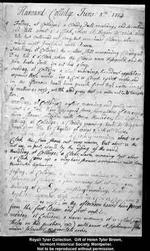
HARVARD COLLEDGE JUNE 8TH. 1753.
8 FRIDAY.
At Colledge. A Clowdy, Dull morning, and so continued till about 5 a Clock, when it began to rain moderately But continued not long, But remained Clowdy all night in which night I watched with Powers .
SATURDAY.
At Colledge, the weather still remaining Clowdy all Day, till 6 o'Clock, when the Clowds were Dissipated, and the sun brake forth in all his glory.
10 SUNDAY.
At Colledge a clear morning. Heard Mr. Appleton expound those words in I.Cor.12 Chapt. 7 first verses, and in the afternoon heard him preach from those words in 26 of Mathew 41 verse, watch and pray that ye enter not into temptation.
MONDAY [11 JUNE].
At Colledge, a fair morning, and pretty warm. About 2 o'Clock there appeared some symptoms of an approaching shower, attended with some thunder, and lightning.
TUESDAY [12 JUNE].
At Colledge, a Clowdy morning, heard Dr. Wigglesworth Preach from the 20 Chapter of exodus 8, 9 and 10th. Verses.
13 WEDNESDAY.
At Colledge, a Cloudy morning, about 10 o'Clock the Sun shone out very warm, but about 12 the heat was, in part, allayed By the rising of the wind.
14 THURDSDAY.
At Colledge, a Clear, warm, morning But about 2 o'Clock came up a very hard shower, acompanied with some thunder and lightning.
15 FRYDAY.
At Colledge, a Clear, warm morning, and so Continued.
16 SATURDAY.
At Colledge, a fair morning, but, not very warm.
17 SUNDAY.
At Colledge, sunshiny -- morning, heard Mr. Appleton expound those words in I. Cor. 12 Chap. from 7, to the end of 11 verse, in the afternoon heard him preach from the first Psalm, and first verse.
18 MONDAY.
At Colledge, a warm morning, at 11 'Clock read Theses on this question, (viz) antliarum et siphonum phaenomina solvuntur ex gravitate aeris.
Page 2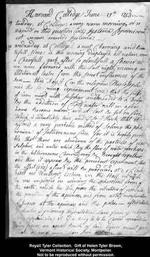
19 TUESDAY.
At Colledge, a very warm morning, at 11 Disputed on this question (viz) systema Copernicanum est verum mundi systema.
20 WEDNESDAY.
At
Colledge, a most Charming and
Beautifull Scene is this morning displayed. All nature wears a
Chearfull garb, after so
plentifull a Shower as we were
favoured with the Last night, receving an
additionall lustre from the sweet influences of the Sun. -- This Day, I (in the religious
Phylosopher) read the following experiment, (viz) that the filings of iron, mix'd with sulphur and kneaded to a Dough By the
addittion of Cold water will in a few hours Become warm, and at last Be set on fire. Which is undoubtedly true, and if so I think that it affords a very probable method of solving the
ph nomina of subterraneous fires. For it is highly probable that there are abundance of the particles of iron, Sulphur, and water which, (By the flux of water perhaps in the subterraneous Caverns,) may Be Brought together, and then it appears By the precedent experiment, that this effect (viz a fire) will Be produced. At 2 o'Clock heard
Mr. Winthrop's lecture in the Hall, in which he was employed in evincing the
sph roidall form of the earth, which he Did, from the vibrations of pendula, the precession of the a equinox, and from actual mensuration of Degrees at the
quinox and the poles. -- After which I extracted the following Hydrostatical Laws from the religious
Phylosopher (viz) 1st: if a Body is to be Carried upwards in any liquor, an
equall Bulk of said liquor must gravitate or weigh more than such a Body.
Page 3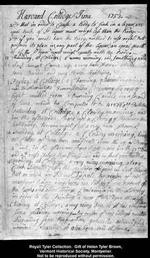
2ndly. that in order to Cause a Body to sink in a liquor, an equal Bulk of said liquor must weigh less than the Body. 3rdly. if you would have the Body, neither to rise or fall But preserve it's place in any part of the liquor, an equal quantity of the said liquor must weigh equally with the Body.
21 THURDSDAY.
At Colledge, a warm morning, and Something windy, about Sunset Came up a very hard shower attended with some Thunder, and very Sharp lightning.
22 FRYDAY.
At Colledge, a Charming, pleasant morning, read Dr. Niewentyts Demonstration Concerning the rays of light emitted from a Burning Candle in a second of time, which he Computes to Be 418660 39 Particles.
23 SATURDAY.
At Colledge, a Clowdy morning, and in the afternoon, Came up a Clowd of thunder and lightning. Towards night fell a very hard shower.
24 SUNDAY.
At Colledge, a Cloudy morning, heard Mr. Cotton of New-town vociferate from the 19. of Proverbs 2nd verse. In the afternoon, from those words in the 37th. Psalm and 4th. verse, Delight thyself in the Lord and he shall give thee thyDesires.
25. MONDAY.
At Colledge, a very rainy, morning, at 11 o'Clock Disputed from the question assigned us last tuesday But on which we Did not then Dispute By reason of Mr. Mayhews Being employed in taking an account of the Books and other things, Contained in the Library in order to the Printing a new Catalogue thereof.
26 TUESDAY.
At Colledge, a very rainy Day, as it has remained since yesterday -- morning. By reason of my illness omitted Disputing from this question, generalia stuum phaenomina solvuntur ab atractione solis et lun.
Page 4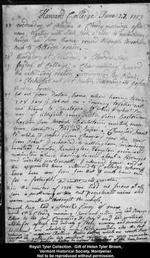
27 WEDNESDAY.
At Colledge. A Clowdy morning. Afternoon, together with Lock, took a ride to Watertown -- Bridge and from thence round through Brookline Back to Colledge again.
28. THURDSDAY.
At Colledge, a Clowdy-- Day.
29 FRYDAY.
At Colledge, a Clear morning. Heard the valedictory oration, pronounced, By Oliver. 2 o Clock set out for Boston, Designing to go from thence home.
29 [JUNE 1753 - JANUARY 1754?]
Sat out from Boston, home where having tarried 7, or 8 Days I set out on a journey together with Mr. Adams to Piscataqua, to which I went By way of Litchfeild, going firstly from Boston over Charlstonferry through Charlestown, Mistick, Menotomy, Lexington, Bedford, Bilerica, Chensford, Dracut to which I passed from Chensford over the river. From Dracut I proceeded to Nottingham, Londonderry, Hamstead, Kingston, Kensington, Hampton, Greenland, Newington where having tarried about a fortnight and vizitted Portsmouth, I returned home and at the appointed time return'd to Colledge where I have been ever since, save that I went home once for a fortnight.
[FEBRUARY 1754.]
This winter, we had a vacation.
In the winter of 1754 we had no snow at all save a smattering or two, But perpetuall rains and warm weather thro'ought the whole.
MARCH [1754].
Beg. [Beginning of March] Had a small flurry of snow.
MARCH 8TH.
A
Clowdy morning. I am now reading my
lord Orrerys letters to his son Concerning Dr. Swift and his writings, which for softness and delicacy of style, accuracy and serenity of sentiment, are absolutely inimitable. Reading also the last volume of Monsieur Rollin's Belles
Lettres which are worth their weight in gold. -- for his excellent reflections on every remarkable event that occurs in history he informs his readers of the true source
Page 5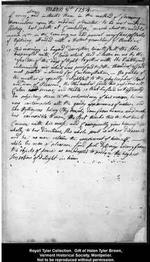
of every
action and instructs them in the method of forming themselves upon the models of virtue to be met with in History.
[17? MARCH 1754.]
Kept sabath at Cambridge. March about the middle.
MARCH 18TH.
In the Evening we had several very sharp flashes of lightning, attended with a Distant grumbling of thunder.
19 [MARCH 1754].
This morning is beyond description, Beautyfull, the Skie bespangled with Clouds which shed a lustre on us by the refraction of the rays of light, together with the healthy and enlivening air, which was purifyed By the thunder, afford most spirited materials for Contemplation. The gaiety of the weather is equally delightfull to the phylosopher, Poet and the man of Pleasure. The Phylosopher finds his passions all Calm,and serene, and Pliable so that he finds no Difficulty in subjecting them to the subserviency of his reason, he can now contemplate all the gaudy appearances of nature and like Pythagoras bring Phylosophy down from heaven and make her conversible to men. The Poet thinks this the Best time to Converse with his muse and Consequently gives himself up wholly to her directions. His whole soul is at her disposall and he no more retains the government of himself. While the man of pleasure find such delicacys arising from the objects of sence as are adapted to produce the highest sensations of delight in him.
Page 6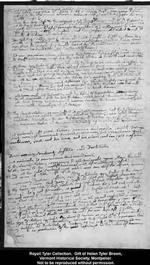
ON THE LAW OF NATURE AND THE MORAL SENSE AMONG ANIMALS AND AMONG MEN, OCTOBER - DECEMBER 1758.
Q. [Query] Has any Species of Animals, besides Mankind, ever given Proofs that they have any idea of Justice, of Rt or Wrong. That they have any Discernment of the Difference between Actions and Characters? Have they any moral Sense?
Q. Have they any sense of the Advantages of Temperance and of the Disadvantages of the Contrary. Will not horses, when they are hot, drink large Quantities of Water without Regret and frequently Chestfounder themselves so? They seem to have very little Concern or Apprehension about the Consequences of Violent Exercise and plentiful Eating and drinking.
Q. Did the Jewish Law that oxen, and Horses, that pushed or kicked a Man to death, or that copulated with any man or woman, should be slain, stand on this Principle, that the Brutes knew the Prohibitions they were under and were accountable, for the Breach of them?
Q. Let me examine, when, and how this Notion of a Law common to Beasts and men, arose in the World, and in what sense it was understood.
Q. If there are Rules of Justice, of Morality, that extend to all Animals, what do those Men deserve, who have believed this and yet plundered, preyed upon, Murdered Fowl, Beasts and fishes in all Ages. -- How can we answer for robbing the Birds Nests of their Eggs and Young, for butchering, fleecing, Sheep, Lamb's, Calves, Oxen &c., or will the Assistance we give them, in providing Food and shelter for them in Winter, and Pasturage in Winter [ i.e. summer?], justify our Cruel Depredations upon them? -- But we never feed or Clothe Robbins, (wild Geese) wild fowl &c. What justice then, in killing them? Is it not Murder?
Q. Self Love and Self Preservation, and the Desire of Propagation, are common to all Animals. But the Law of Nature, which teaches other Species to nurse their Young, teaches man to imbue the tender Minds of Children, with Knowledge and Virtue.
Q. The Law of Nature, as an Instinct is perhaps common, but the Institutions which Reason adds to Instinct, are peculiar to man. Now Justice, Temperance, Gratitude, Benevolence, &c. are Institutions of Reason, are found and proved to be human Duties, and beneficial to society, by Reason and Experience.
Jus naturale est quod Natura omnia Animalia docuit, Jus enim istud non est humani Generis proprium, sed omnium Animalium, quae, aut in terra, aut in mari aut in Ccelo nascuntur.
Temperance, Prudence, Justice, and Fortitude.
Jus naturale, is omnium Animalium.
Is the Law of Nature, common to all Animals, from Man the Lord of all, down to the smallest Animalcules, discernible by Glasses?
Are all the Rules of natural Law, which men are obliged to observe, incumbent upon all Birds, Beasts, fishes.
Temperance, Prudence, Justice, and Fortitude, are Duties of the Law of human Nature. But have the Beasts and Birds and Fishes, given any Proofs that they have any Idea of these Virtues? any sense of their obligation to Practise them? Do they not gormandize, do they not what Prudence, do they not rob, each other. Are not many of them timorous, afraid of Trifles and shadows? But their Vices are no Proof that they are not under these Laws, more than human Vices will prove that Men are not. -- We do not understand their Language, their signs, nor their sounds enough to know, what Knowledge they have of their own Constitutions, and Connections. But is this Question worth a [illegible] Discussion? -- I have no concern with a society of Birds or Beasts or fishes, or Insects. I shall neither be [concerned?] for nor against the Cattle. The Law of Nature includes the Laws of Reason as much as Self Love and Desire of Propagation and education, includes those Rules of Temperance, Prudence, Justice, and Fortitude which Reason, by the help of Experience, discovers to be productive of the good Happiness and Perfection of human [Nature?].
Page 7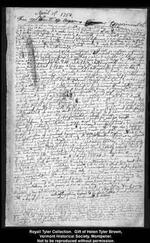
APRIL 1ST. 1754.
Then, Mr. Winthrop began a Course of Experimental
[NOTES ON CIVIL LAW, DECEMBER 1758 - JANUARY 1759.]
Sequestration is when two, or more, deposit a controverted Thing, with a 3d Person, on that Condition, that he, at the Conclusion of the suit, Dispute, will restore the Thing to the Conqueror. This is either voluntary, which ismade done by the Agreement of Parties, or necessary, which is done by the Authority of a Judge. This, regularly, is prohibited. From a Deposit, arises a twofold Action, direct and contrary. A direct Action of detinue, is a personal Action of good Faith, famous, public, which is given [illegible] to the Deponent against the Depositary, tof or this, viz. that he may restore the thing deposited, sarcio, to repair, mend, and repair the Damage given by fraud and faults committed. Lata Culpa, by a gross fault. A contrary Action is given to the Depositary against the Deponent, to be saved harmless.
A Pawn or Pledge is a Contract of the Law of Nations, of good faith, reconstans, consisting in a thing, fact, by what means, in what Ways, an Obligation to Contract, in fact by a fact, an Action or Deed, consisting in fact, in a Thing, by which any Thing is given to a Creditor by a Debtor or [any other?] for a as a Security of his Debt, on that Condition that the same Thing be restored, in Specie, on the Payment of the Debt. Soluto Debito, the Debt being paid, eadem res in Specie. From this Contract, arises an Action, direct and contrary. The direct Action of a Pl for a Pawn is given to the Debtor, on Payment of the Debt, against the Creditor, for this, that he restore the Pawn with all Cause, and repair the Damage, given by fraud, or by any gross or even by a light fault. Levis culpa, a light fault. A Contrary Action is given to the Creditor, against a Debtor, to be saved harmless. Of the Performance of fraud, of fault, and Accident. Praestare. To answer for a fraud or fault is to repair the Damage, given by Deceit, by Accident or by fault. Deceit is all subtilty, Deceit, or Contrivance, employed to circumvent, deceive, or delude another. A fraud is all subtilty, Deceitfulness, or Contrivance, employed to circumvent, deceive, delude another. A fault is nothing less than Negligence [illegible] , whether of omission or Commission, in the Affairs of another, and is Tfold [Threefold] gross, light and lightest. A gross fault is not to use that dilligence which even a negligent father of a family uses, or to be ignorant of what all understand. This in Contracts is compared to Deceit, fraud, excepting the Case of a Capital Crime. A light fault is not to use that diligence which a thrifty and diligent father of a family, uses in his own Things. This fault is regularly meant, denoted when the Word faults is put simply in the Laws. The lightest fault is not to adhibit, use, employ, exert that diligence, which a most diligent father of a family exerts. An accidental Misfortune is a greater Strength, to which human Weakness is not able to resist. Humana, Casus fortuitus, a casual Mishap. A Chance medly. [illegible] Dolum. To answer for a fraud. Fraud is answered for, paid for, repaid in all Contracts. Accidents, misfortune in none, except in Lending, Loan. Loan. Payment of what is not due, is in some respects like a Loan, which nevertheless is not a true Contract but a sort of Contract, by which he who received what was [undue ?]is obliged to him, who by Error and Ignorance paid what was [illegible] that it be [illegible] . A fault, regularly, is made good, repaid, according to these 3 Rules. . As often as aContract Bargain is driven, a Contract is taken, entered into, for the Sake of the giver alone, so often Deceit only and a gross fault is answered for, as in a Deposit. 2. As often as a Contract is celebrated, for the sake of the receiver alone, so often fraud, deceit, fault, even the lightest is answered for as in [commodatum]. A direct Action of [illegible] is a personal civil Action, demanding a Thing, which is given to a Lender against the Borrower to restore the Thing lent in Specie, and answer for fraud and [illegible] the light fault. 3. As often as the Utility, Advantage, Benefit of both, takes place in a Contract, so often fraud, a gross and a light fault, is answered for, as in a Pawn, Buying and selling. The aforesaid Rules concerning fraud, Negligence and Misfortune, then cease, if the contractors otherwise agree; except if it is agreed that fraud shall not be answered, even when any special Reason shall except this or that Contract from the common Rules.
Of the Obligations of Words. An Obligation of Words, or any Stipulation, is a Contract of the civil Law, of strict law, consisting in Words, by which he, who is asked, whether he is about to give [or to do?] what he is interrogated, answers. Emancipation is an Act by which Children are dismissed from the father's Power. Act. From a Stipulation arises a two fold Action, a personal Action of a certain Thing; if a certain Thing is drawn into a Stipulation and of an uncertain Thing, or an Action, from a Bargain, if an uncertain Thing is drawn into a Stipulation. Each is a personal Action, civil, of strict Law, which is given to the stipulant, against the Promisor to oblige him to perform what he promised.
Every Stipulation is either pure, or for a certain day, or conditional. A pure Stipulation is one which is contracted without [the addition?] of any time or Condition, and in that pure Stipulation, the Day of the Obligation begins, and comes immediately. The Day of the Obligation is said to proceed when a Thing, drawn into Obligation, begins to be due, altho it cannot yet be demanded. A day is said to come when that can be demanded which is due. A stipulation, at a certain day, is that which is [made] annexing a day, appointing a day, in which the Money is to be paid. A day may be added to an Obligation 2 Ways, either as a Time from which, as after 5 years I will give, or as a Time to which, as untill 5 years, or as long as I shall live. In the 1st Case, the day of the Obligation, immediately [goes?] but comes not before the day exists. It is [right?] however for the Debtor to pay before the day if he will. In the other Case also, the time being past, the Obligation is perpetuated by the Law it self, but the Promissor of the Agreement, by the Exception of the Agreement [illegible] may [illegible] himself. The time moreover may be added to the Stipulation not only expressly, but also it is sometimes tacitly implied; which happens if a Place is added to the Stipulation, the Performance it self of the Thing, or fact in it self against a space of Time. A conditional stipulation is, one which is made, with regard to a future, [uncertain?] Case, in that the day of the Obligation, neither goes nor comes, unless the Condition happens. Yet the Hope of the future Obligation is transmitted, from the Part of each Contractor to his Heirs. [But?] if the Condition is affixed to the present or the past time, that is scarcely esteemed a [Contract?] nor differs the Obligation.
Page 8, upside down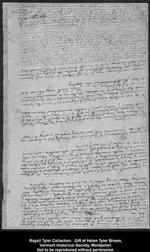
[Page 8, upside down] A Stipulation is made in any Tongue yet the Question and Answer must agree, and, all things [illegible] drawn into that, which are in Commerce, also the facts must be possible and lawful, [illegible] own, not [anothers?]. If a fact is drawn into [illegible] in a Stipulation, the Promissor cant be compelled precisely to the fact, but is freed from [illegible] and therefore it is [actible?] to [illegible] Stipulator, for thus he exempts himself from the difculty of proving that which is due.
Of the 2 Parties of stipulating and promising. The [accessors] of the Stipulation are 2 Stipulators to each of whom the same Thing, Speech by [illegible] is [promised?] in the whole. The [Accessor?] of promising or of owing the [joint?] Promisers or [illegible] conjuncta oratione. Fellow Promisers, joint Promisers [illegible] 2 [promisors?] who singly promise the same Thing, at one time, to a Person Stipulating. Stipulans, in eadem Res, the en solidum, the same thing to a [illegible] . Eandem Rem, in solidum. That therefore 2 may be joint Accessers to [illegible] of Stipulating or promising, it is required 1. that the same Thing be drawn into the stipulation, brought into the Stipulation. 2. That the Promise be made from one and the same Cause. 3. That the whole be promised to both, and by both. Yet one of the Accessors may be rightly obliged, purely, and the other, on Condition, or to a certain day. The Effect of such a stipulation is, that the 2 Partners may act or agree, for the whole, singly, separately, yet so that one accepting, receiving a Debt, or one paying the whole Obligation is destroyed. But if [illegible] joint Debtors are obliged to any thing by an alternate Engagement, they may enjoy the Benefit [of the] Divisons. Of the Stipulation of Servants. Even servants may stipulate from the Person of their Masters, also an hereditary servant, and a common servant. But a servant acquires not any thing that is stipulated to himself, but to his Master or to the Inheritance or if there are many Masters he stipulates to each for Part, unless it was by the Order of one, or for one by name. Yet a servant, if he stipulates for a fact, acquires it to himself. Of the Division of Stipulation. [illegible] Stipulations are either, judicial, or pr torial, or conventional, or common.
Page 8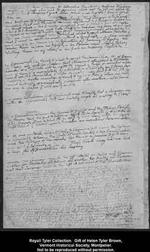
[Page 8, right side up] [RULES FOR DETERMINING THE EXCELLENCE OF A LANGUAGE, OCTOBER - DECEMBER 1758.]
What are the Rules, Criteria, to determine the Merit or Excellence of a Language? -- Suppose you was to examine, which was the best, and which the worst of the Languages, Greek, Latin, french and English? How would you decide.
One Excellence of a Language, is Conciseness. That Language is to be preferred in which Ideas and Thoughts may be clearly conveyed to the Hearer or Reader in the fewest Words. -- But Q. whether Conciseness is not a Property, a Talent of the Writer rather than of the Language. Would Dean Swift if he had been had been as great Master of french as he was of English, have expressed himself as concisely as he has in English? -- Some Languages have Technical Words to express certain Collections of Ideas, that cannot be expressed, in another, without a Periphrasis. A Man may write more concisely, in french on fortification and Gunnery, and Cookery and Dancing, than he can in English. In Italian, upon Musick, Statuary, Painting, than in any other. In Greek on Anatomy, Physick &c.
2. Copiousness, i.e. Variety of Words to express the same Idea. For as Eloquence and Poetry, are wrote in Measure, feet, Numbers, often times a Dissillable [illegible] or a Trissilable will be wanted to round a Period, or compleat a Line. Now, if there is a Monasyllable, and a Dissillable or a Trissillable, in the same Language to express the same Idea, the Writer or Speaker may select that which fits his Measure. Another Advantage of Variety of Words is this. When one Word cannot be so easily or emphatically pronounced, after another, out of several one may be chosen, that will exactly answer.
3. A proper Distribution of Consonants and Vowells, that a Language may neither be effeminately soft, nor brutally rough and grating to the Ear.
4. A Connection [or] Analogy between the sound of the Words and the Things signified by them. Thus, the great and sublime Objects should be signified by Words of a loud grand sound. Slow Actions should be expressed by slow heavy Words. But quick swift Actions by Words that require, and occasion an impetuous Pronunciation.
5. As one considerable Design of Poetry and Eloquence is to move the Passions, a similarity between the sound of Words separately or in Combination and the Passions of the mind. For there is a peculiar sound to every one of the Passions. -- These Hints may lead me into a large field of Speculation and Inquiry.
Inference. One Language may be the best adapted, for Poetry and Eloquence, another for Philosophy and science, and another for Drollery and Humour. But that Language will be the best, which has most of these Characteristicks.
Page 9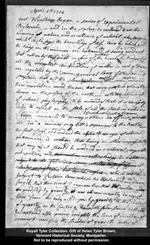
[WINTHROP'S LECTURES ON EXPERIMENTAL PHILOSOPHY.]
APRIL 1ST. 1754.
Mr. Winthrop began a series of Experimental
Phylosophy, and in the 1st place he explained to us the meaning, nature, and excellence of natural
phylosophy, which is, (he says) the knowledge of those laws by which all the Bodys, in the universe are restrained, it being evident that not only those great masses of
matter the heavenly Bodys, but all the minutest combinations of matter in each of them are regulated by the same general laws. For instance it is plain that all the planets observe
exactly the same
uniform rules in their revolutions round the sun, that every particle of matter observes on the surface of the earth. -- As to the usefulness of natural
phylosophy, to be convinced of that, it is necessary only to reflect on the state of all the Civilized nations of Europe, compared to many nations, in
affrica,
of as quick natural parts as Europeans, who live in a manner very little
superiour to the Brutes. -- The first Cause, and indeed the alpha and omega of natural phnomena, is motion, their being an utter impossibility that any effect should be produced in a natural way without motion, and
this motion or rather Bodys in motion are subject to the following laws. 1st two bodys of different velocitys or swiftnesses, but aequal masses which motion is subject to Certain laws which he explained, and I have forgot. But thus much I remember,
the that motion, produced by gravity, was universally in right lines, from the body acted upon by gravity, to the Center of gravity, as the Center of the earth, for instance, or the like. He explained also, powers, weights, the line of direction of powers and weights, the Center of gravity, Center of
Page 10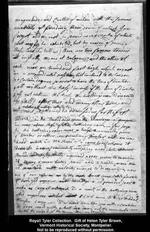
magnitude, and Center of motion, with the several methods of finding them, some of which I've forgot, and the rest he showed us examples of which cant
easyly be exhibited. But by reason of some of these laws (he tells us) there are two famous towers in Italy, the one at Bolognia, and the other at
[Pisa], each near an hundred feet high which are not in a perpendicular position, but inclined to the horizon to a Certain degree, so as not to have the line of direction fall without the Base, because if the line of direction fell not within the Base, the buildings would inevitably fall. After this and many other things and Terms
relating to motion, velocity &c. explained he dismiss'd us for the first time. -- He touch'd also upon the advantages of gunpowder in war, above those of the Battering ram. For says he, the Battering ram was a hugh, and unweildy
peice of timber or rather combination of timbers, with an iron head much in the shape of a rams head, whence it drew its name, commonly weighing near forty thousand Pounds, and consequently required a 1000 men to manage it,
if being a man being scarce able to handle more than 40 lb.
[illegible] with velocity enough to do execution. Now one of our cannon, by the
[illegible] almost
irresistable force of
rarifyed vapour will discharge a 36 pounder so as to make as large a Breach in a wall, as the Battering ram, and requires but
about 6 5 or 6 men to order and direct it. Therefore 6 men can do as much execution now with a Cannon as 1000 could with a Battering ram, and the momenta are equal the velocity of the Cannon exceeding
Page 11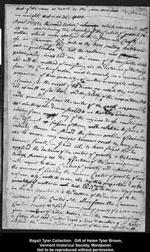
that of the ram, as much as the ram exceeds the Cannon in weight, that is as 36: 40000.
APRIL 3D. 1754.
The second lecture,
wherein which was wholly taken up in explaining the Propertys of the Centers of gravity and motion, which were applyed to the instruments, Cheifly in use in Common life, such as, the lever, pulley,
Ballance axis in peritrocheo, &c. But the
Ballance was
chiefly principally insisted on. The reason of it was fully explained and the method of weighing, viz the distances of the
Bodys from the Center of motion, must be precisely in a
reciprocall proportion of their
quantitys of matter or weights, always
alowing for the weight of the Beam on which they are suspended, as well as friction, and the falsity of the supposition, that radii proceeding from the center of the earth are
parrellel.
Mr. Winthrop also demonstrated to us that all the advantages arising from
[illegible] any of the engines in use, resulted from the different possion
[position] of them, with relation to force and velocity, thence he
shew'd the famous problem of Archimedes viz, to move any weight however great by any force however small. -- I had like to have forgot that he applied the doctrines of the center of gravity to the heavenly
Bodys,
shewing us the affections of the sun and planets with respect to their Centers of gravity, and instructed us in the manner of finding the Common Center of gravity of any 2 of 'em e.g. earth and moon, viz By this proportion as the
quantitys of matter in
[illegible] Both added
together is to the quantity of matter in the one
separtely so is the distance of their centers to the distance of the Center of the other, from the Common Center sought. And to find the common Center of gravity of 3, 4 or 5 or any given number of
Bodys, having found the common center of any 2, from that said Center draw a line to another of said
Bodys and find the common Center of gravity of these two respecting the
Page 12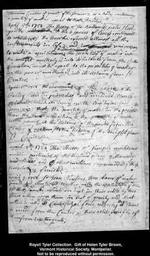
common Center of gravity of the former 2 as a Body containing a quantity of matter equal to Both said
Bodys.
APRIL 5TH. 1754.
The theory of the Ballance, scales, steel -- yard &c. and all and the 3 species of lever's continued to which (viz) the lever he referred allmost all the instruments in life, and [illegible] universally. To make a quilibrium, the product of product of the quantity of matter in the weight multiplyed into its distance from the Center of motion, must be equal to the quantity of matter in the power, multiplyed into it's distance from said Center.
APRIL 6TH. 1754.
The phnomina of The nature of the Pulley, axis in peritrochaeo, and inclined Plane explained, which all depend on the laws before laid down (viz) that the quantity of matter in the weight bears the same proportion to the quantity of matter in the power, as the distance of the power from the Center of motion, to the distance of the weight from said Center.
APRIL 8TH. 1754.
The Theory of simple machines and in particular of the inclined plane, of the wedge and screw, and other machines compounded of these simple ones, finish'd.
APRIL 9 1754.
Sir Isaac Newtons three laws of nature proved and illustrated, together with the application of them to the planets, which are kept in their orbits by two forces acting upon them, viz that of gravity and that which is call'd itstheir Centrifugal force whereby it they strives to recede from the Center of their orbits, and fly off there from in tangents.
Page 13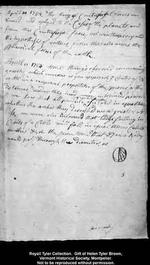
APRIL 10, 1754.
The theory of Centrifugal forces, continued; and aplyed to the Cases of the planets; and from this Centrifugal force, Mr. Winthrop confuted the hypothesis of vortices, from this also arises the spheroidal form of the earth.
APRIL 11 1754.
Some thing's observed concerning gravity, which
encreases as you approach the Center of the earth in a reciprocal proportion of the squares of the distances, and under this head were introduced pendula and we saw that all pendula
of equall length oscilated in equal time whether the arches they described were greater or less. We were also inform'd that
bodys falling in Chords of a Circle will fall in equal times Caeteris paribus; and in the same time that the same Body would pass through the diameter, as
[Figure -- see page image]
Page 14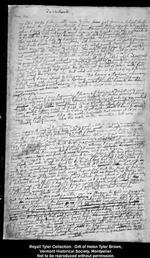
[LETTERS TO THREE FRIENDS ON STUDYING LAW, OCTOBER - NOVEMBER 1758.]
To [John] Wentworth.
Mon Ami
My letters, for the future will come to you, from not from a School House but from the Cell of an Hermit. I am removed from Worcester to Braintree where I live secluded from all the Cares and Fatigues of busy Life in a Chamber which no mortal Visits but myself except once in a day to make my Bed. A Chamber which is furnished in a very curious manner, with all sorts of Hermetical Utensils.
Here, no Idea of a Lady, of Diversions, of gay Life Business or of Pleasure ever enters. Here I read, smoke, think, and sleep. Old Roman Lawyers, and dutch Commentators are my constant Companions. What ample Provision have I here accumulated for lasting Felicity! The only Thing I fear is, that all my Passions, which you know are the Gales of Life, as Reason is the Pilot, will go down into an everlasting Calm. And what will a Pilot signify, if there is no Wind.
To prevent this I must intreat you to redouble your Letters, which always raise a full Gale of Love, sometimes almost a Tempest of Emulation and some times a Breeze of Envy, and will be sufficient, in Addition to those of a few other Friends, to waft the Vessell, tho she is not the best of sailors, with full Speed, along the Voyage. -- But what, and where is the Port of my Destination? In sincerity I am afraid to tell you. Tis however a Harbour, where every Vessell may ride securely. A Harbour, in which, tho Tempests rage around, and Thunders roll above, and Earthquakes shudder beneath, the vessell can receive no Damage neither the Vessell, her Cargo or her Crew, ever receive any Damage.
But to be plain, I am beginning Life anew. I have new Friendships to make, new Employments to follow, new Concerns, Prospects and Studies, opening before me. [illegible] And now I have mentioned Studies, I find my self entering an unlimited Field. A Field in which Demosthenes, Cicero, and others of immortal Fame have exulted before me! A Field which incloses the whole Circle of Science and Literature, the History, Wisdom, and Virtue of all ages. -- Shall I dare to expatiate here in full Career, like the nobler Animals, that range at large, or shall I blindly, basely creep, like the mole, or the weezell? -- Tell me.
To [Tristram] Dalton.
How long is it my Friend, since I either received a Letter from you or you from me? Some years I believe. And how long will it be, e'er another Letter passes between us? Why If I may judge of the future by the past, I shall receive one from you about 6 months hence, and then an Intermission of 2 or 3 years will succeed. This has been the Course of our Correspondence, and perhaps you would be as well pleased, if the Intermission should be of 2 or 3 Centuries, or inperpetuo instead of 2 or 3 years. You need not hope however to escape so. Whenever I am fatigued with roman Lawyers and Dutch Commentators, I will set down, and discharge the Vapours of the Brain, upon Paper, and send it away to you write to you, as Painters turn their Eyes to a green mild pleasant Green Colour after long Attention to black in order to ease and Relieve the Eye. This is said, (by the Way) in Conformity to the common Place Cant of the present Day that The study of Law is the most dry, unentertaining study in the World, which I take to be full as wise as Lady s Contempt of Shakespears Tragedies in [illegible] the Lethe of Mr. Garrick. You have heard many Persons say that the study of Mathematicks [illegible] and of Physicks is dry. Others can find no Beauties in Poetry. And I believe them, as undoubtingly as I believe some others, when they say that Law is dry. Every Thing, my Friend, is dry in Proportion as it is not understood, and [illegible] I shall not be at all surprised to hear a young Spark whose whole Attention is dissipated among Horses and Ladies, (heaven forgive me) fiddles and frolicks, Cards and Romances, say that the Law is dry.
But to examine this Matter a little, can no Pleasure be found in tracing to their original sources in Morality, in the Constitution of human Nature, and the Connections and Relations of human Life, the Laws which the Wisdom of perhaps fifty Centuries, has established for the Government of human Kind.No Pleasure in studying the Eloquence of Greece and Rome in those stupendous Monuments of it which have been the Wonder and Delight o f every Age, to the present Day? No Pleasure in the Study of those Remains, those prescious Remains of grecian and roman Eloquence, which have been the wonder and delight of preserved to the Admiration of all Ages, down to the present day? Far otherwise, So far [otherwise?] that I assure you, even themost Common Law of England, and the precedents and [Statutes?] of former Times, which are most venomously [misused?] at this day, when once their [illegible] Language is understood, afford us all the Pleasure of Reasoning in as [great?] Perfection as your favourite science of Mathematicks with the Exception only that we have not always that absolute Certainty, that we have in Mathematichs.
Page 15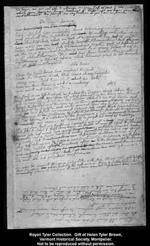
Tis true, we are not able to attain, in every Case of Law, that total Certainty which you have in some Problems and Theorems, nor have you in Mathematicks, the success in every Problem which you have in some.
To Samll. Quincy.
How surprizingly we how inviolably
How resolutely, how inviolably, how surprizingly we have preserv'd and pursued The Resolution we took of writing each other upon Law. Points of Law, which we took at Weighmouth. -- But Oh my Friend how easily we are bro't fired to lawdable Determinations! But oh proh Dolor, how soon are such Determinations forgot? -- Quite as suddenly as the Vows of perpetual Constancy made by a young Fellow, when in the most violent Hurry. This [illegible] has some how or other recalled to my Memory a Pice of Advice, which Polonius gives to his Daughter in Shakespears Hamlet.
I do know
When the Blood burns, how prodigal the soul
Lends the Tongue Vows. These Blazes oh my Daughter
Giving more Light than Heat, extinct in both,
You must not take for Fire.
The soul is no less Prodigal in lending the Tongue Vows, when the Blood glows with Ambition of getting Learning or Virtue, than when it burns with a very different Passion, the Passion alluded to in these Lines. And perhaps the Protestations of the Lover, are as sincere [illegible] as the Resolutions of the scholar. And as the generous Lover, who by such Vows, has deceived and has and deflowered an innocent, virtuous Lady, would think him self bound in Honour, and in Conscience, to fullfill his Promises, so should the generous Schollar esteem it a violation of his Conscience, a base, ungenerous, debauching and ruining of himself, to forget his Vows of Industry.
For my own Part, my Conscience reproaches me with a long long series of such Self Perfidy! I start sometimes, and shudder at myself, when the Thought comes into my mind how many [illegible] million Hours I have squandered in a stupid Inactivity neither furnishing my mind nor exercising my Body. Yet I continue to new Reflections continue to arise, and I every Day determine to begin a new Course of Life tomorrow. My Resolutions are like bubbles, [illegible] they are perpetually rising to the surface of the stream [illegible] and then are [broke?] and vanish by every puff of Wind. [illegible] Yet new ones rise and die in perpetual succession.
In order to connect the preceeding Letter with this, let me add [that?] to taste this Pleasure, active Industry, and not now and then a sudden Resolution is necessary alone, is necessary. -- And now I have mentioned Resolutions how [unwilling?] and [remainder missing.]
Page 15, upside down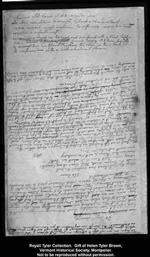
[Page 15, upside down] [ON SOME FRIENDS WHO NOURISH WOUNDS IN THEIR HEARTS, OCTOBER - DECEMBER 1758.]
Vulnus alit Venis, et caeco carpitur igni.
Alo, alere, alui, alitum, to nourish. Vulnus, a Wound or Hurt.
Carpo, carpere, carpsi, carptum, to waste away. Carpor to be [troubled?]. Carpitur, is consumed, wasted.
He nourishes a Wound in his Veins, and is consumed with a blind hidden fire. -- Warner, Fessenden,Clark,Cranch,Quincy. All of them [cherished?] by their incessant Thinking, the Wound in their Hearts, and all consume, with a hidden internal flame.
Page 16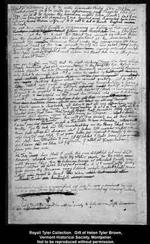
[A LETTER TO RICHARD CRANCH ABOUT ORLINDA, A LETTER ON EMPLOYING ONE'S MIND, AND REFLECTIONS ON PROCRASTINATION, GENIUS, MOVING THE PASSIONS, CICERO AS ORATOR, MILTON'S STYLE, &C., OCTOBER - DECEMBER 1758.]
What is Wisdom? Is it, to write dramatic Poetry, like Milton or Shakespear? Is it to write on Astronomy and Physicks like Newton, or is it to know the human mind like Lock? Does it consist in Genius and Learning? No Genius and Learning have been oftener mad than wise. It is not to Act or think beyond man kind.
[Draft of a Letter to Richard Cranch.]
Say was there most of Cruelty or of Cunning in sealing up this cruel scroll this Paper full of Disappointment, Spleen and Heart Ache in a Letter from you. -- As the Doctor, to cheat his Patients Eyes, conceals his bitterest Potions in the sweetest Consalves and Confections, as the Manchineal conceals her [illegible] Poisonous juices under the Appearance of a fair delicious Fruit, as the Bee conceals her self and her fatal Sting in the Center of an Honey Comb, in the same manner Orlinda incloses this Paper, full of Disappointment, Spleen and Heart Ach, in a Letter from my dearest Friend!
You are sensible, my Friend, that the night Working Fancy of a Lover which steals him often, o'er seas and mountains to theArmsCompany of his Mistress, and which figures, in his Slumbers, a thousand various scenes of Pleasure, only serves to increase his Misery, when he wakes, by the Thought, that he cant possibly partake such Pleasures is too far [removed?] cannot possibly enjoy exciting Desires which he cannot gratify. just so thisLetter Billet has roused [illegible] in my Imagination a scene of Pleasure, which I should not otherwise have wished for tho't of, a scene which seems to be grappled to my soul with Hooks of Steal, as immoveably as I wish tobe grappled inthe my Arms the Nimph, who gives it all its ornaments.Wherever I go, whatever I do, asleep or awake, This dear bewitching scene attends me, and takes up all nay Thoughts. If I look upon a Law Book and labor to exert all my Attention, my Eyes tis true are on the Book, but Imagination is at a Tea Table with Orlinda, seeing That Face, those Eyes, that Shape, that familiar friendly look, and hearing Sense divine come mended from her Tongue. When I should be at my Devotions When the rest of the family are at their Devotions I am payingmine my Devoirs across a Tea Table to Orlinda.When I attempt to Sle I go to bed and lie ruminating on the same Ideas half the night, then fall asleep and dream about the same, till morning Wakes me, and robs me of my Bliss. If, as grave folks say Madness is occasioned by too long and close an Attention to one set of Ideas, I shall soon I fear grow mad for I have had no Idea, but that of Orlinda, that Billet and Disappointment in my Head since you saw me.
Oh Tea, may how shall I curse thy once delightful but now detested stream. May I never taste thy Waters more, for thy Waters will forever bring the Remembrance of Orlindas Cruelty, my eager Wishes and fatal Disappointment. Or if I must taste, for my Cup from thy stream may I drink whole Buckettsfull from Lethe to forget [illegible] my Woe, which that would otherwise without such an Antidote always renew.
Shall such Cruelty go unpunished. No may she have a husband be in less than a year from this day be tied in the everlasting Chains of Wedlock.
If he has the Spirit of a Man, he will be ready to bite his own Flesh. [illegible]
Page 17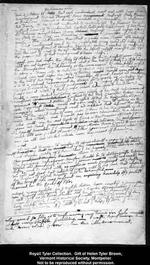
[Draft of a Letter to an Unidentified Correspondent.]
My Friend
Such is the Nature of Man the human mind, that each individual must and will have some Employment, for his Thoughts, someAmusement, Business, study, Pleasure or Diversion, virtuous or vicious,lawdable or Contemptible, to consume his Time. If he is not instructed to contemplate the Heavens, he will instruct him self to contemplate Cockell shells and Pebblestones; if his Rank and Fortune exempt him from Labour Business, he will engage himself in Study or in Play, in Hunting or whoring, or something else, better or worse. The first Question, then that a young man should ask himself is, what Employment am I by the Constitution of my mind and Body, and by the Circumstances of Education, Rank and Fortune, directed to pursue? And the next is what is the best Method, the safest, easiest, nearest Road to the proper End of that Employment I have chose?
Suppose you had chosen the study of Nature, for the Business of your Life, should you not inquire in the first Place, what is the End of that study? Is it to improve the Manufactures, the Husbandry, or the Commerce of Mankind, or is it to adorn a Library with Butterflies of various sizes, Colours and shapes? Or suppose you had chosen the study of History, should you not inquire is the End of this study the naked Knowledge of great Names and [illegible] [Actions?] or is it a personal Improvement in Virtue and Capacity, by imitating the Virtues and avoiding the Vices of great men, and by judging of the Effects of Causes now at Work, by those Causes which have appeared heretofore? Should aman Student in History inquire chiefly of the Dress, Entertainments and Diversions, [illegible] instead of the Arts, Characters, Virtues and Opinions of ancient Nations, and the Effects of these on their public and private Happiness of the would not you laugh? There iswas nothing in the Lamp, by which Demosthenes wrote his orations, that deserved the Attention of the present Race of men, more than there is in the Candle by which I write this Letter. And I would pay no more Admiration to a man who could [tell] me the exact Highth of Cicero, or the Number of Hairs that grew upon his Head, a Pice of Knowledge that I cannot now attain, than I would to one who could tell me the exact Number of Letters, Comma's and semicolons that are in all his Works, which [I] have the means of knowing.
It is not
We are not therefore, to measure of Admiration of a man by the Number alone,of proposition [illegible] but by theImportance, Usefulness and Utility and Number jointly of the Propositions that he knows, and his Dexterity in apply [illegible] them to Practice.
The great secret therefore, the main The primary Endeavour therefore, should be to distinguish between Useful and unuseful, to pursue the former and to with unwearied Industry, and to neglect with much Contempt all the Rest. We need not fear that subjects of Inquiry will be so few, that the Treasures of useful Knowledge will be exhausted. Every Moment of the longest Life, may be spent in acquiring Knowledge of the greatest Moment, in the Course of Life.
Perhaps many hundreds, in the English Nation, have employed the sameAttention, Industry, and Sagacity in discovering the Properties of Animalcules that Escape the natural sight, as Sir Isaac Newton did in discovering and demonstrating the true system of the World. I will venture yet further, perhaps these men, if they had employed Experiment and [Geometry?] in the [method?] he used would have made as wonderfull discoveries. It [is] the Method then, and not the Drudgery of science that is chiefly to be [illegible] .
Why am I so silly as to trifle away my Time in suchuseless unprofitable scribbling -- waste Paper, [illegible] Pen, Ink, Time, Wood, Candles, in this idle Amuzement.
Page 18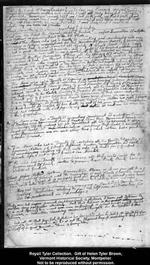
What is the Cause of Procrastination? To day my Stomack is disordered, and my Thoughts of Consequence, unsteady and confused. I cant study to day but will begin tomorrow. Tomorrow comes. Well, I feel pretty well, my head is pretty clear, but Company comes in. I cant yet study tomorrow, but will begin in earnest next day. Next day comes. We are out of Wood, I cant study: because I cant keep a fire. Thus, something is always wanting that is necessary.
What are the Proofs, the Characteristicks of Genius? -- Answer Invention ofa System new Systems or Combinations of old Ideas.
[illegible] The Man, who has a faculty of inventing and combining into one Machine, or System, [illegible] for the Execution of some Purpose and Accomplishment of some End, a great Number and Variety of Wheels, Levers, Pullies, Ropes &c. has a great Mechanical Genius. And the Proofs of his Genius, will be (unless it happen by mere luck) will be proportionably to the Number, and Variety of Movements, the Nice Connection of them, and the Efficacy of the entire Machine to answer its End. The last, I think at present, ought to be considered in [estimating?] any Genius. For altho Genius may be shewn in the Invention of a complicated Machine, which may be useless, or too expensive, for the End proposed, yet one of the most difficult Points is to contrive the Machine in such a manner, as to shorten, facilitate, and cheapen, any Manufacture &c. For to this End a Man will be obliged to revolve in his Mind perhaps an hundred Machines, which are possible but too unwieldy or expensive, and to select from all of them, one, which will answer the Purposes mentioned.
2. The Man who has a Faculty of feigning a great Number, and Variety of Characters, Actions, Events &c. and combining into one regular, correct, consistent Plan or Story, a great Number and Variety of Characters, Actions, Events &c. has a great poetical Genius. And the Proofs of his Genius are in Proportion to the Variety, Consistency and Number of his Characters, Actions and Events; and to the nice Connection and Dependence of these upon each other thro a whole Poem. And these Proofs have been given in a surprizing degree by Milton and Shakespear,Homer,Virgil &c. Milton has feigned the Characters of Arch Angells and Devills, of Sin, Death, &c., out of his own creative Imagination and has adjusted, with great Sagacity, every [illegible] Action and Event in his whole Poem to these Characters.
3. The Man, who has a Faculty of inventing Experiments and [reasoning?] on them [means?] of Starting new Experiments from that Reasoning, and on these Experiments forming new Reasonings till he reduces all his Experiments, all his Phenomena, to general Laws and Rules, and [illegible] combines those Rules to an orderly and regular Dependence on each other, thro the whole System, has a great Phylosophic Genius.
4. The Man who has a Faculty of considering all the faculties and Properties of human Nature, as the Senses, Passions, Reason, Imagination and faith, and of combining classing all these into order, into Rules, for the Conduct of private Life, has a great Genius in Morality.
5. He who has a Faculty of combining all these into Rules, for the Government of Society, for the to procure Peace, Plenty, Liberty, has a great political Genius.
Thus Order, Method, System, Connection, Plan, or whatever you call it, is the greatest Proof of Genius, next to Invention of new Wheels, Characters, Experiments, Rules, Laws, which is perhaps the first and greatest. Q. [Query] Does not the Word Invention express both these faculties, of inventing Wheels &c. and putting them in order.
Q. May not Genius be shewn in aranging a Mans Diet, Exercise, Sleep, Reading, Reflection, Writing &c. in the best order and Proportion, for His Improvement in Knowledge?
These are but vague, general, indeterminate Reflections. I have not Patience to pursue every particular attentively. But, This Patience is the greatest Attainment or a great Superiority to a mans own unsteadiness, is perhaps one of the greatest Marks of Genius. Inatention, Wandering, Unconnected Thoughts, are the opposites to this Patience.
Q. [Query] Had not Mr. [Prat?] some such Reflections in his mind, when he said that Mr. Edwards had given proofs of a Great Genius.-- And Q. is not The Pilgrims Progress, according to these Rules, a Proof of a great Genius. -- There is Invention.
Page 19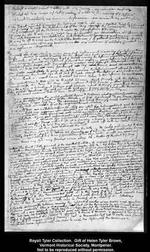
Ballast is what I want, I totter, with every Breeze. My motions are unsteady.
Of what use to a Lawyer is that Part of oratory, which relates to the moving of the Passions? Without Simplicity no human Performance can arrive to any great Perfection.
The Talent, and Art of moving the Passions, may be used in a Capital Trial by the Counsel for the King, to raise the Resentment of the jury, against the Crimes of the Prisoner, and by the Counsell for the Prisoner, to move the Compassion of the Jury.
It may be used to raise, in the judges, jury and Spectators, an Admiration, and Esteem of the wise, humane, equitable and free Constitution of Government we are under. It may be used to rouse in the Breasts of the Audience a gallant Spirit of Liberty, especially when declaiming upon any Occasion, on any Instance of arbitrary Conduct in an Officer or Magistrate.
Sound in is I apprehend a more powerful Instrument of moving the Passions than Sense. Musick is capable of raising in the Mind every tender, generous, noble Passion and Sentiment. And as a Musician, to get the skill of moving the Passions, must study the Connection between sounds and Passions, so should an orator. Every Passion has its distinct peculiar sound. Anger, and Compassion, produce very different Modulations of the Voice, and so do fear, Love, Contempt, joy, sorrow, and Admiration. An Orator must study to gain the Art of moving the Passions, must attend to Nature, must observe the Sounds in which all sorts of People, express the Passions and sentiments of their Hearts, and must learn to adapt his own Voice, to the Passion he would move. The easiest Way to this will be to possess his own Mind strongly, with the Passion he would raise, and then his Voice will conform it self of Course. Thus if you will raise in a jury a Resentment of some great Crime, resent it strongly yourself, and then the boldest Expressions Thoughts and Words will occur to your mind, and utter themselves with the most natural Tone of Voice, Expression of Countenance and Gesture of your Body.
[Let] me examine in the greatest orators of Rome and Britain, what peculiar Sounds are used [to] express the different Emotions of the Mind -- as Grief, Resentment, Fear, Horror, Courage, Compassion, Love, joy &c. To examine this Point thoroughly would require a search [of] all the Poets and orators of all the Languages I understand.
Grief and Fear, in Tullies Oration for Milo, are uttered by Interrogations, and Exclamations. Quid me reducem esse voluistis? An ut, inspectante me, expellerentur ei, per quos essem restitutus? Nolite obsecro vos, pati mihi acerbiorem Reditum esse, quam fuerit ille ipse Discessus. Nam qui possum putare me restitutum esse, si distrahar ab iis, per quos restitutus sum? Utinam dii immortales fecissent (pace tua, Patria, dixerim). This Figure which addresses Things without Life, as a Country, a Temple, a Monument, Virtue or Vice, Wisdom, Folly &c. as if they were Personages, is much used both in Poetry and oratory. [illegible] says,
Welcome for thee fair Virtue all the Past.
For thee fair Virtue welcome even the last.
He looks and speaks to Virtue as Tully looks and speaks to Patria his Country. -- I believe tis called Apostrophe some times. Popes Address to L.B. in the Conclusion of his Ethic Epistles, is called an Apostrophe. Come then my friend my Genius come along, Oh Master of the Poet and the Song.
[illegible] The Point, that Tully drives at, is the Acquittal of Milo. He is afraid that the judges will sentence him to death or Banishment. It is Lachrimis non movetur Milo &c. His design here is to raise their Admiration of Miloes strength and Constancy of mind and of his Love of Virtue and Contempt of Exile. Then he speaks, in pungent, keen Questions, to the judges. Vos Iudices quo tandem animo Eritis? Memoriam Milonis retinebitis, ipsum ejicietis? Et erit dignior Locus in Terris ullus, qui hanc Virtutem excipiat quam hic qui procreavit? Thus I see that any great Agitation of mind breaks out into exclamations and Interrogations. -- Vos, Vos appello fortissimi Viri. There is great Warmth in that Repetition of Vos, qui multum pro Republica sanguinem effudistis Vos in viri et in civis invicti appello periculo, Centuriones, vos que militus; vobis non modo inspectantibus, sed etiam armatis, et huic Iudicio praesidentibus, haec tanta Virtus ex hac Urbe expellatur? exterminabitur? projicietur? An Address with so much Vehemence An Appeal to the Centurions and soldiers, complimenting them with the Epithet fortissimi Viri [illegible] made with so solemn and vehement a Repetition Vos Vos, and feeling with so much sensibility, the Ingratitude, Cruelty, and folly of Banishing a Man who had rendered the Republic such Important services and was able and zealous to render still more, must have drawn Tears to their Eyes and Rage to their Breasts. His Mind seems to waver between Indignation at Clodius, and Admiration of Milo, between Love and Gratitude to Milo for his past favours to him and Services to the State, and his fears Fear, dread of his Banishment. His Mind is a Ship in a Tempest, tossed and tumbled with great Impetuosity, every Way. He breaks out into Exclamations to the Immortal Gods, and to the happy Coasts that shall receive Milo when banished and to his own ungrateful miserable Country if she shall banish him. I take it this Peroration for Milo, may be studied as a Model of the Pathetic.
I should distinguish between moving the Passions of another, as an Orator, and expressing Passion naturally, like a Dramatic Poet, for tho there may be an Affinity between them, yet they are distinct. Tully, in that Peroration, expresses the Passions of his own Mind, his Love, his Gratitude, his Grief and fear, and at the same time moves the Passions of the Judges, the Centurions and soldiers by appealing to them, to Heaven by exclaiming to his Country and that Country that should receive Milo if Banished, but a Dramatic Poet has to make each Character express his own Passions well, in order to raise the Passions of the Audience &c.
Page 20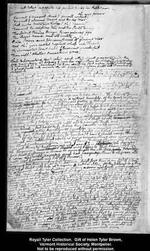
With what pathos does Othello bid farewell to War, in Shakespear.
Oh now forever
Farewell the tranquil Mind! farewell content;
Farewell the ploomed Troops and the big War
That make Ambition Virtue! Oh! farewell!
Farewell the neighing Steed, and the shrill Trump
The spirit stirring Drum, th'ear piercing fife
The Royal Banner and all Quality,
Pride, Pomp, and Circumstance of glorious War
And Oh! you mortal Engines, whose rude Throats
Th'immortal Joves dread Clamours counterfeit
Farewell! Othello's Occupations gone!
These Exclamations, Apostrophe's, express, with the utmost grandeur of sounds, the deep Grief, Misery, and despair that were in raged within his Mind. Q [Query], is Grief always so sonorous and harmonious? Is it ever expressed in short broken sounds? I believe not, it always swells into numbers. I may say that Passion swells into Numbers, and Metaphors.
I have so many Irons in the Fire, that every one burns. -- I have common, civil, natural Law, Poetry, Oratory, in Greek, latin, french, english to study, so that when I set down to read or think, so many subjects rush into my mind that I know not which to chuse.
But to what End this subtle Inquiry into Niceties. -- A minute Examination of syllables and sounds will never procure Genius. But Genius has often hit [illegible] without design upon the most grand and proper sounds.
What are the Motives, that ought to urge me to hard study? The Desire of Fame, Fortune and personal Pleasure. A critical Knowledge of the Greek and Roman Tongues and of the and french Poetry, History and Oratory, a thorough comprehensive Knowledge of natural, civil, common, and Province Law, will draw upon me the Esteem and perhaps Admiration, (tho possibly the Envy too) of the judges of both Courts, of the Lawyers and of juries, who will spread my Fame thro the Province, will draw around me a Swarm of Clients who will furnish me with a plentiful Provision for my own Support, and for the Increase of my fortune. And by means of this Authority and Consideration, with the judges, Lawyers, Juries and Clients, I shall be able [illegible] to defend Innocence, to punish Guilt, and to promote Truth and justice among Mankind. -- But besides these Motives, there is another, no less powerful than either, which is the active Acquisition of Knowledge, in a peaceful, undisturbed Retirement. Here I should moderate my Passions, regulate my Desires, increase my Veneration of Virtue, and Resolution to pursue it, here I should range the whole material and Intellectual World, as far as human Powers can comprehend it, in silent Contemplation. -- Now, if Fame, Fortune, Pleasure and Virtue have not Power to influence me, what am I? Oh Genius Oh [illegible] ! Oh Learning! Oh Eloquence! how shall I may I dare to think I have the first? How shall I assume a Power to command the other two. Knowledge I can and will acquire, and has Language Power to charm, and shall not I avail my self of that Power?
Longinus says there is an Art of the Sublime. Swift says there is an Art of the Profound. Q. [Query] What Rules will help us to acquire both or either. As the sublime is a Property of Discourse, whether in Speaking or Writing, some real Cause which produces in the Hearer or Reader, Transport and Rapture, no doubt, that Property may be found out by examining critically those Passages which produce that Effect, and by comparing them with other Passages which produce no such Effect, or a contrary Effect, as Drowsiness, &c. And when the true, real Cause is known, we may endeavour to infuse it into our Discourse -- e.g. If this Cause consists in sound only, we must inquire what sounds have and what have not this Effect upon us. And we must chuse out such Words, as have that sound and avoid others. If it consists in sounds, we must inquire whether it consists in the sound of a particular Word or in the combination of all the Words in a Period. If it consist in the Idea only, we should inquire what Ideas have this Effect on the human mind? And we shall find, that the Ideas of Objects that are great in Nature, as that of the Sun, Moon, the Sky, Earthquakes, Thunder, Tempests, Comets, extensive Prospects &c. have this Effect on the mind. If it consist in the sentiment, we must inquire what sentiments have this Effect on the Mind? And we shall find that fixed Resolutions in favour of Virtue, Courage, disinterested Charity, Generosity, Contempt of littlenesses &c. have this Effect. Now from such observations as these, no doubt, Rules may be collected, and reduced into an Art for acquiring the sublime, [illegible] the grand and noble, and for avoiding the low, little and mean in Discourse. I have not Leisure nor Patience, for examining the sublime Passages in Tully,Virgill,Milton,Shakespeare,Pope,Bolinbroke, Swift,Addison,Tillotson,Ovid,Horace &c. by these Rules. In that very sublime Passage in Milton where the Effect of Satans Speech upon his infernal Host is described," The sublimity consists, Partly, in the sound of the Words, partly in the Ideas, that they convey, and partly in the Sentiments. -- Out flew Millions of flaming Swords drawn from the [Thighs] of Mighty Cherubim, the sudden Blaze far round illumind Hell, highly they ragd [Against] the highest,and fierce -- These words Many of these Words, as flew, flaming, [ . . . ] drawn, mighty, Blaze, far, round, highly,ragd, have when pronounced seperately, a grand Sound, and here they are arranged into a very harmonious order.
Page 21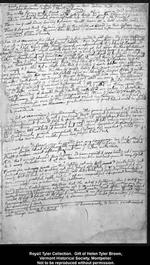
And fierce with grasped Arms, clashd on the sounding Shields the Din of War, Hurling Defiance towards the Vault of Heaven.
The Words fierce, grasped, Arms, clashd, sounding, War have a loud grand sound and are so disposed in this Line, as both to elevate and quicken the Voice of the Reader, which makes the whole frame of both Reader and Hearer thril with Transport.
Then in the next Line, hurling, Defiance, Vault, have all a bold elevated sound.
Thus it seems that the bare sound of the Words, as disposed in this Passage, have an Effect upon the Hearer like the sound of a musical Instrument, playing some grand and sublime Tune.
Now let us examine the Ideas conveyed by these Sounds. Out flew The Idea of Millions, a great, a surprizing Number of blazing swords. There is something great and terrible in the Idea of a single blazing glittering sword, because we associate with it, the Idea of Slaughter and Blood and Death, which naturally shock and arouse us, but when the Idea of Millions of blazing swords, as much larger than our swords as a Devil is supposed larger than a Man, flying instantaneously out from the scabbards of a whole Host of Devils, and brandished in air, enters the Mind it alarms, rouses, astonishes it. But then the sudden Blaze [created] by all these Swords illumins all Hell. The Idea of a Flash of Lightning, is grand and elevating to the Mind, but a flash like this, that brightens the dark Abodes below, astonishes every mind.Than Then the Idea of grasping suddenly their Arms, Spears, Swords &c. and each one clashing his upon his shield, raises an Idea of a direful Clash, that neither Thunder, Earthquake nor Tempest,tho' all of them grand sounds can equall. Then the Din of War calls up the Ideas of all those sounds that attend an Army, the sound of Drums, Trumpetts, and all sorts of musical Instruments, the murmuring, shoutings, screamings of living and [dying], which is very terrible and shocking to the Mind. Then come the Ideas of Hurling, which denotes strength and Activity, both of which are [illegible] and elevating, then of Defiance, which denotes a grand Temper of mind, then the Idea of the Vault of Heaven, which is one of the sublimest Objects in Nature. -- It is scarce possible to conceive how a [illegible] greater Number of great Ideas could be asserted in so few Lines.
[Lastly] let us examine the Sentiments. The general sentiment is that of Rebellion and Warfare, proclaimed by all the infernal Host against the Almighty, which is a sentiment that cant fail to excite Horror and Astonishment in every human mind. Then comes a sentiment, that they raged against God which raises the [illegible] still higher, till at last it breaks out into open impious Defiance, scorn and Contempt, which compleats the Passage and makes the Blood of [every?] Reader, who has a soul, curdle from his fingers to his Toes.
Perhaps few Passages can be quoted, in any Language in Prose or Verse, where sounds, Ideas, and Thoughts [illegible] so perfectly and seem to [contend?] which shall produce most Astonishment in the Reader, with this.
N.B. Tho I always admired this Passage, and have repeated it 1000 times, yet I never found 1/2 so many Beauties in it as this Examination has laid open to my sight.
Thus we see [illegible] in this Passage, not only soft smooth and smooth sounds but such as are harsh and grating, not only Ideas of Objects that are beautiful and lovely, but of such as are deformed and detestible, not only sentiments that are generous, grateful, noble, but such as are ungrateful, impious, horrible, may be employed in producing the sublime.
But to return. I collect from this Heap, that The Art of the sublime, like the Art of natural Philosophy is [illegible] in a science, and that Experiment and Observation are the natural means of improving both. We must make Trial of the Effects of different Sounds, of different Ideas, and of different Sentiments, on the human Senses, Passions, Imagination, and Understanding, to discover general Rules for producing the Sublime and avoiding the low.
Tis desirable to know the general system of humanity, to know the most remarkable Things in this World.
Page 22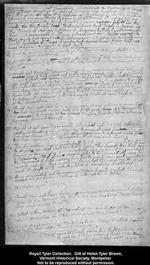
[THE CASE OF FIELD v. LAMBERT, DECEMBER 1758.]
The Mistery of Masonry not Freemasonry, comprehends the Plaistering of Walls and Cielings, as well as the Laying of Bricks and building Chimneys, so that it is more extensive than the Addition of Bricklayer. Masonry deals in Cement, in every Thing which requires the Use of the Trowell, and was an Art, an Occupation before the society that goes by that name was ever heard of in the World, for this society took its Name from that Trade by reason of The Trowell which was an Instrument common to these Gentlemen and their less honourable brethren, the Bricklayers, and Mortar managers. This Society has been called [Lobronorum?], ficto nomine, generosa, compacta societas, which shews it was a Nick name borrowed from these manual Artificers and applied to that Society.
Q. [Query] Is not the omission of the County, in the Direction to the Constables of Braintree, a fatal omission.
2. Should it I not have been added, after "said Joseph," these Words, "who sues as well in Behalf of the Poor of the North Precinct, in Braintree, as for him self."
3. Would not the Word "found" have been more proper than "taken up" and is and if Defendant pleads not guilty modo et forma, will not a failure to prove that Field had taken the Horses up i.e. that he had bridled or haltered them or else had begun to drive them towards the Pown, be a failure to prove the Declaration? Or in other Words, will Evidence Proof by Witnesses that he had seen the Horses, been to his Neighbours House to borrow a Halter, and then into his own to get a Hand to assist him in catching the Horses, be sufficient Evidence of his taking up the Horses according to the Words of the Declaration.
4. Should there not have been a more express and positive Averrment at the that the Horses broke into his Close and there did Damage there than [illegible] that which is implied in the Words, "rescu'd 2 Horses which the Plaintiff had taken up Damage feasant," there?
5. Should it not have been averred, that Lambert entered the Close subtilly and craftily, intending and contriving, to prevent the said Field from driving them to Pound, and of consequence to defraud Field of his Recompence for the Damages the Horses had done him?
6. The Declaration begins in Trespass, but it concludes in Debt, "which sums so forfeited and due," the Defendant has refused to pay. This sounds like Debt for some certain sum that is compleatly due by force of some Law of the Province. These sums may be said to be compleatly due, but the Damages, that Field was [to] recover for himself, were quite uncertain. Now Q [Query] whether this is not in some sort blending together Debt and Trespass, and Q. whether such a blending is not fatal?
7. It is concluded ad Damnum of said Joseph the whole sum Damages and forfeiture and all. -- Q. will not this be fatal.
8. Is Mason a good Addition?
9. Should there not have been a more particular Averment of the Value of the Damages the Horses did, in breaking Fence, trampling and eating Grass &c.
10. What is the Method of Proceedings on an Information? Can an Information be filed vs. Lambert this Court?
11. Should the forfeiture be sett forth to be to the Poor of the North Precinct or to the Poor of the Town of Braintree.
[ . . . ] Close against the Road, from which the Horses broke in was [ . . . ] in that Place where the Horses broke in [ . . . ] Difference, as the Horses had no Right to go in [ . . . ] Road?
Page 23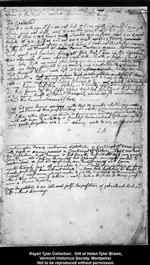
And Q [Query] Whether that Entry and driving away, is a Rescous. had Field had not actually taken up the Horses, i.e. had not bridled nor haltered them.
[A LETTER TO WILLIAM CRAWFORD TELLING "HOW I LIVE," OCTOBER 1758.]
To
[William] Crawford
How it is with you I know not, but if I am rightly informed, I am yet alive and not dead. And to prove it to you, I will tell you how I live. I sleep, 12 or 13 Hours, [illegible] Smoke 10 or 12 Pipes, read 5 or 6 Pages, think of 19 or 20 Ideas, and eat 3 or 4 Meals, every 24 Hours. [illegible] I have either mounted above or sunk below, I have not Penetration enough to say which, all Thoughts of [illegible] Fame, Fortune, or even Matrimony. You must not conclude from all this, that I am in the Vapours. Far otherwise. I never was in much better Health, or higher Spirits in my Life. Both my mind and Body are in a very easy situation, tortured with no Pain, disturbed by no Anxiety, and transported with no Pleasure. The strongest Desire I have left, is that of [illegible] seeing my friends at Worcester, But when or how that desire will be gratified, I know not. and the only Passion I have left, is Envy of the Pleasure You enjoy in living so near B.G. Remind the Dr. and his Lady of my sincere friendship,Mr. Putnam and his Lady, [Col. Gardiner] and his Lady of the same and Betsy Green, of the sighs, Wishes, Hart Ach, Hopes, Fears, that in spight of the vain Boast of stoical Tranquility, above expressed, continually attend the Remembrance of her.
Pray let me know e'er long within this 12 months, whether you live, as I am at this present Writing, and whether you remember me, or not. Oh Lethe, either Spare my friends, or drown me and my friends together, for I will not bear to entertain a fruitless Remembrance of them, after they have quite forgotten me. -- Adieu, write to me, as soon as you [can?].
J.A.
Contemptu Famae, contemni Virtutem. A Contempt of Fame generally begets or accompanies a Contempt of Virtue. -- Iago makes the Reflection, that Fame is but breath, but vibrated Air, an empty sound. And I believe Persons of his Character, are most inclined to feel and express such an Indifference about fame.
Crooked Richard says all men alike to some loved Vice incline, Great men choose greater sins -- Ambitions mine! Some such Reflections and Excuses, I suppose, the worst men always make to justify, or palliate to them selves and others, their own worst Actions. Making such a Reflection is throwing Conscience a bone to pick.
Iago. Reputation is an idle and false Imposition, oft got without Merit and lost without deserving.
Page 24, upside down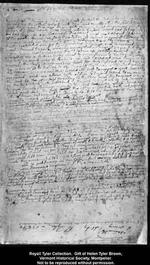
[Page 24, upside down] [THE CASE OF FIELD v. LAMBERT, CONTINUED, DECEMBER 1758.]
2 Horses --10th. of Octr. 1758. One Pound L.M.
To answer J. [Joseph] F. [Field ]&c. in a Plea of Trespass, for that the said Luke [Lambert], at Braintree aforesaid, on the 10th of last Octr. with Force and Arms entered the said Joseph's Close there, and there and then with force and Arms drove away and rescued from the said Joseph Two Horses which the said Joseph had taken up in his Close aforesaid, Damage Feasant, and was about to drive to the public Pound in said Braintree, which Rescous is against the Law of the Province, made in the Tenth Year of [illegible] the Reign of William the 3rd, intituled an Act for Providing of Pounds and to prevent Rescous and Pound Breach, whereby amongst other Things it is enacted, That if any Person shall rescue any Horses, taken up damage feasant, out of [the] Hands of a Person being about to drive them to the Pound; whereby the Party injured may be liable to lose his Damages and the Law be eluded; the Party so offending shall for such Rescous forfeit and [pay] the sum of 40s. to the Use of the Poor of the Town or Precinct where the offence is committed; besides all just Damages unto the Party injured; and an Action bath arisen to the said Joseph to recover the said 40s. aforesaid forfeiture to the Poor, and the Damages which he the said Joseph bath sustained by the said Rescous which he says is equal to Twenty shillings more of the said Luke, which sums so forfeited and due, the saidGeorge Luke,tho often requested, bath not paid nor either of them, but unjustly refuses to do it, to the Damage of the said Joseph as he saith Three Pounds.
[ON INDIGENCE AT HOME, DECEMBER 1758.]
haud facile emergunt quorum Virtutibus obstat
res angusta domi.
They will hardly emerge from Obscurity, whose Virtues are obstructed by Indigence at home. To whose Virtues, a narrow Thing at home opposes.
[THE CASE OF FIELD v.LAMBERT, CONTINUED, DECEMBER 1758.]
For that the said Luke, on the l0th of Octr. last,at with force and Arms and against entered the said Josephs Close there in Braintree aforesaid, and then and there with force and Arms drove away, and rescued from the said Joseph tho the said Joseph then and there [illegible] Two Horses which the said Joseph had taken up in his Close aforesaid Damage Feasant, and was about to drive to the public Pound in said Braintree, which Rescous [is] against our Peace and the Law of this Province, made in the Tenth Year of [the Reign of] William the 3d.
[Am?] I sensible of the Importance of the Hazard, I run? I risque my Character and of Consequence my Business, on the fate of this Writt. [I am?] in doubt about the sufficiency of it. I am in doubt whether Trespass [will] lie upon that Act. Whether the Damages done by the Horses to Fields fences and Grass should not have been more Specially sett forth? Whether it is right to declare, for the forfeiture to the Poor ad damnum of Field. It was [desirable?] that somebody should sue for that forfeiture, and who so proper as the Party injured. How could Debt have been laid for his Damages, when it is disputable how much they amounted to? The Act says just Damages, but the Act has not [asserted?] how much is just Damage in this Case. But may not Debt lie, [where trespass lies?] Can Damages be given and [assessed?] by a jury in Debt.
If one declares in an Action of Trespass for the taking away of his Cattle, or one particular Thing, he ought to say, that he took away his Cattle or other Thing Praetii so much. [I] have not declared for taking away the Horses pretii so much, but I have declared that Field sustained so much damage by the Rescous and by the Trespass of the Horses. But if he declares for taking away Things without Life, he ought to say ad Valentiam so much.
Damages are frequently given to the Party and a fine to the King in Trespass. Why then may not damages be recovered to Field and the forfeiture to the Poor in Trespass? In all Trespass there must be a voluntary Act and also a Damage, otherwise Trespass [will?] not lie. Lamberts Entry and driving his Horses were voluntary Acts, and the Damage to Field was the Breach of his fence and destroying his Grass and [illegible] his [illegible] .
Page 24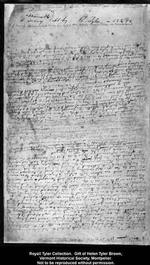
[Page 24, right side up]
[ I declared?] ad Dampnum of Field. How could I have expressed ad dampnum of him and the Poor too.
Page 25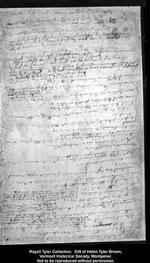
Q. [Query] Whether Debt is not a more proper Action than Trespass?
Should not the Damages the Horses did to the Fences, Grass &c. have been Specially shewn, als. how can Defendant make his Defence.
Does not this Declaration shift from Trespass into Debt?
Can Defendant know without a Special Shewing of the Damage done by the Horses to the Fences, Grass &c., how to combat the Plaintiff, what Evidence to produce.
That heterogeneous Mixture of Debt and Trespass, still perplexes me.
Trespass, Entry, Rescous, forfeiture. Can a Forfeiture be demanded by Plaintiff in Right of another, in an Action for Trespass.
Trespass for Damages, and Debt for forfeiture to the Poor.
Upon the Commission of that Offence, the forfeiture becomes compleatly due to the Poor. -- Should not something have been said of his suing in Behalf of the Poor, for the forfeiture.
What have I been doing. Only drawing a Writt.
When a particular Act of the Province is declared on should that Passage of it which is particularly to the Purpose be shewn in h c Verba
Page 26, upside down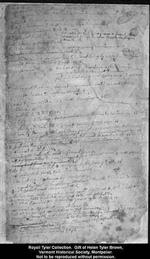
[Page 26, upside down] [A LIST OF PLEADINGS, OCTOBER - DECEMBER 1758.]
Bond to give Deed.
Trespass on the Case vs. Sherriff for the Default of his Deputy.
Case by Baron and feme vs. Executor, on a Promise made to the feme while [sole . . . later.?]
Ind. [Indebitatus] Ass. [Assumpsit] for service done at a customary Price.
Plea, in abatement, that the service was insufficient.
Ind. Ass. for keeping a Horse to Hay. 3.
Scire facias vs. Bail. 4.
If it was a [illegible] Writ, I'd lay a Quantum Mer. as much as he deserved. Can Book be sworn to on Q.M.
Ind. Ass. on a Note of Hand.
Debt to the Clerk of the Company. On Province Law.
Trespass on the Case, by an Infant
Quantum Valebant for Cyder sold by Infant, suing by his father, his guardian [or] next friend. Trespass for breaking a [Cows leg.?] 6.
Trespass upon the Case for refusing Marriage after Promise. 7.
[Trespass upon the Case] on a protested Order vs. Drawer.
[Trespass upon the Case] for not Building a good Barn according to Order.
Covenant broken, for not warranting Land, according to Cov.
Trespass. Quare Clausum fregit. 9.
Trover and Conversion of a Kettle belonging to Executor.
Partition. 10.
Trespass Q.C.F. & D.f. 10.
Writ, for declaring at a Bargain unruly Oxen to be orderly. 10.
Quant. Mer. and Ind. Ass. 2 Counts, for Work and service. 11.
Debt [illegible] by Farmer of Excise qui tam for selling Rum without Licence.
Trespass on the Case by 2d. Indorser vs. 1st Indorser for the original Drawer his [illegible] Absence from the Province and 2d. Indorser unable to pay the Debt. 13.
Trespass on the Case for Breach of Promise of Marriage. 14.. Ejectment vs. Disseisor. joindre of Ind. Ass. and Insimul Comp [Computassent].
Case by Guardian to non Compos for Labour done by non Compos. Money lent sued for by Administrator. 16.
Case for Money received to Plaintiff by a [demand?] for Money lent. 16.
Case on a Note for 24 Gallons of Rum. 16.
Ejectment of a Mortgagor by Mortgagee.
Account by Administrator de bonis non vs. Administrator of the Administrator of him to whom the 1st Administration was committed.
Case on an Order accepted and payed by Plaintiff at Defendants Request 18.
[Case] on a Bill protested or refused to be accepted. 18.
Case vs. a Carrier for suffering Goods to be spoiled. 18.
Warrantia Chartae vs. Heir at law. 19.
Debt vs. Executor for not exhibiting a ful Inventory. 19.
Town Treasurer vs. a Person for entertaining a Tenant without giving Notice to select men, whereby Charge arose to the Town. 20.
Town Treasurer vs.
Case vs. Town Treasurer by Town Treasurer vs. Constable 20. Case for Bail vs. Principal for Security. 21.
[Case] on an order accepted by Defendant.
Debt for Rent. 21.
Page 25, upside down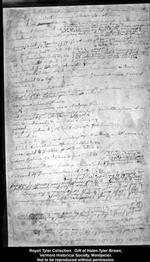
[Page 25, upside down]
[Trespass] on the Case, for not rendring an Account of Oxen received to kill and [sell?].
Warrant to Constable to convey a Pauper to next Town.
[Presentment] vs .... [Officer?] 22.
Presentment for a Riot. 23.
Presentment, for Administering an Oath without Authority.
Complaint, by Farmer of Excise, vs. one for not giving an Account of distilled Liquors and Lemons taken in and sold.
Case, for Mony had and received to Plaintiffs Use. 24
Case by surviving Creditor. 24.
Debt on a judgment of Court. 25.
Presentment for selling fat, instead of Butter. 25.
Debt, by Town Treasurer vs. a Person for receiving and entertaining a Pauper. 26.
Complaint to a justice, vs. one for writing scandalous Words, and Warrant thereon 27.
Action for scandalous Words. 28.
Case vs. Defendant for taking away his Son from Plaintiff with whom he lived to learn his Trade, before the Time agreed on was out. 28.
Trover of a Pice of Timber.
[Equity?] of Redemption in a Mortgage Deed. 29.
Debt vs. one for not maintaining his half of a Partition fence, between him and Plaintiff, on 10th of Wm. 3. Chapt. 18.
Case, for not maintaining &c. on the same Law. 29.
Ejectment
Trespass and Ejectment, by Plaintiff [Heir?] to Devisor after Estate [Tail?] ended. 29.
Ejectment. 30.
Trespass on the Case for drowning Plaintiffs Meadow by a Mill dam. 30.
Ejectment. Declaration on Plaintiffs own seizin &c. 30.
Complaint to justice, vs. Dear Killer. 31.
[illegible] , Caption of a Petition to Gen. Court. 31.
Imparlance, Prayer for one. 32. in Ejectment.
Warrant of Town Treasurer vs. Collector. 32.
[NOTES ON PROBATE LAW, OCTOBER - DECEMBER 1758.]
Tis absurd, to for a Testator to say, after he has devised his Lands to one in fee, that they shall go over to another.
There is no [Remainder?] to an Estate in fee. A fee simple, upon fee [illegible] but a Testator may very legally and sensibly devise Lands to one in fee, and then say, in Case Death or any other Accident should happen to incapacitate the Devisee to take, then the Lands shall go to another.
If a Testator should devise 20 to one, and all the Rest of his personal Estate to another, and it should happen that this particular Legacy could not pass to that Legatee, the Residuary Legatee shall have that 20 before the Executor.
Page 27, upside down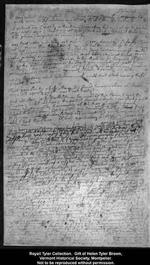
[Page 27, upside down]
[A LETTER TO WILLIAM CRAWFORD, DESCRIBING A VISIT TO BOSTON, OCTOBER - NOVEMBER 1758.]
Mr. Crawford.
Am returned from Boston, and according to my Promise sett down begining to write you a Discription or a History of what I saw, and heard, &c.
I distrust my Capacity, without an Invocation, but am afraid to make one, for I know the Muses are not fond of such Work. Take it then in the plain Language of common sense.
My Eyes were entertained with Objects, in every figure and Colour of Deformity, from the Blacksmith in his darksome Shop to the Chimney Sweeper rambling in the Streets. My Ears were ravished with every actual or imaginable sound, except harmonious sounds, from the Hurley burley upon Change, to the Rattling and Grumbling of Coaches and Carts &c. The fragrance of the Streets, were a continual feast to my Nostrils. -- Thus Pleasure entered all my senses, and roused in my Imagination, scenes of still greater tumult, Discord, Deformity, and filth.
As for Reason, what Entertainment could that find, among these Crouds? None.
Thus you see the whole Man, the Senses, Imagination and Reason were all, equally, pleased. Was I not happy?
But all this is the dark side. -- In reward of this Pain, I had the Pleasure to sit and hear the greatest Lawyers, orators, in short the greatest men, in America, harranging at the Bar, and on the Bench. I had the Pleasure of Spending my Evenings with my friends in the silent Joys of serene sedate Conversation, and perhaps it is worth my while to add, I had the Pleasure of seeing a great many, and of feeling some very [pretty?] Girls.
Page 27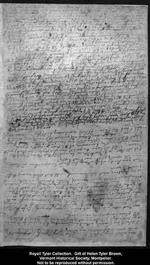
[Page 27, right side up] [FURTHER NOTES ON CIVIL LAW, DECEMBER 1758 - JANUARY 1759.]
Judicial [stipulations] are those which proceed from the mere Office of a judge, as Surety vs. fraud [illegible] pursuing a servant, who is in flight. Surety concerning fraud is required, when the Danger is, lest an Adversary commit a fraud [upon things of?] ours. Surety concerning pursuing a servant, is that [when?] an Heir promises the Legatary, that he will pursue at his own Expense a servant [which?] is [given?] as a Legacy, who is running away, and restore either servant or his Value. Praetorial Cautions are those which proceed from the mere Office of the Praetor, as a surety of Damage, that is [illegible] and of Legacies. Damage is all Diminution of our Patrimony. A Damage not done, is that which is not yet done but which we fear will be done. [A] surety of a Damage, not done, is that by which, the owner of decayed Buildings engages to his Neighbor [that] he will repay thereafter what ever Loss or Damage shall [happen?] by the fault of his buildings. [A ]surety of Legacies is that by which the Heir, having given Bondsmen, engages to a Legatary to whom a Legacy [is] bequeathed on Condition, or at a certain day, that he on the fulfilment of the Condition, or [illegible] of the day, will pay the Legacy [illegible] . But if the owner will not give the said sureties to the Neighbor, nor the Heir to the Legatary, the Neighbour is put into possession of the decayed House by the Praetor and the Legatary into [possession?] of the hereditary Things. It is peculiar to the Pretors Cautions to [need Bondsmen?]. Conventional Cautions are those which are conceived by the Agreement [of] either Party. There are as many Kinds of these as there are of things to be contracted. Common are those which proceed as well, from the Office of Praetor, as of that [of] Judge, as that the Estate of a Pupill shall be safe, which is given by Tutors; and a Surety, by which, he who manages the Business of another when he doubts of a Command, he engageing that the Master shall have [illegible] due. Of useless Stipulations. An useless stipulation is one that has no Effect in Law. Stipulations are useless, either by Reason of the Thing, or of the fact included in the Stipulation, or by Reason of the Contractor, or by Reason of the form or manner of the Contract. A stipulation is useless by Reason of the Thing, if any one stipulate a Thing, which neither is, nor can be, in the nature of Things; allso a Thing which is not in Commerce, as a Thing sacred, holy, religious, public, a free man, or at least beyond the Commerce of the stipulator. Also if any one stipulate a property purely, or [even?] the Thing plainly incertain. If any one shall promise the fact Act of another, without any Penalty annexed, also [anything that?] is impossible, either in nature or Morals. By Reason of the Contract, if they are unqualified, as dumb, deaf, mad, infant; also, as made between a father and a son or servant and Master; also if any one shall stipulate to Another than himself unless it shall [be] to him to whom it is [illegible] , or a Penalty [is annexed?].
Let me get a clear Knowledge of the Proceedings in the Courts of Probate. Executor, who accepts the Trust is accountable to the judge of Probate. [A Judge] of Probate, by Warrant under his Hand and seal, directed to sherriff &c. to cause such suspected Person to be apprehended, and brought before such judge to be [examined?] and proceeded with. A Person suspected of convaying or imbezzling Part any Part of the Estate of any Person deceased, shall have been cited, pursuant to Law [sentence unfinished]
Page 28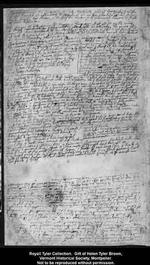
[SHAKESPEARE'S CHARACTERS AND FIGURATIVE LANGUAGE, OCTOBER - DECEMBER 1758.]
Shakespeare, in the Character of Lady Mackbeth, and of Gertrude, the Wife of old Hamlet, and afterwards of King Claudius, and in the Character of Lady Anne in King Richard, has shewn a sense of the Weakness of Woman's Reason, and strength of their Passions.
The Horror of both divine and Human Vengeance, that attends guilty minds is strongly represented in the Characters of Mackbeth and his Lady. He grows daily more and more timorous of the Nobility, and of every man of [Respect?] in their Realm. At last, they are afraid that the stones and trees, and Birds will reveal their Murder and demand Revenge. Blood for Blood.
Shakespears vicious Characters are aggravated beyond Life. He draws Ingratitude, Treason, Hypocrisy, Murder, in the strongest Colours of Horror. -- In Thinking of any Thing, every Image that can resemble it, rises at once in strong Colours in Shakespears mind. When the News of his Ladies death is brought to Mackbeth, he turns his Thoughts upon Life.
Out out brief Candle!
Lifes but a walking Shadow, a Poor Player
That struts and frets his Hour upon the Stage
And then is heard no more! It is a Tale
Told by an Ideot, full of Sound and Fury
Signifying Nothing.
Here he compares Life, 1st to a Candle, then to a Shadow, an Image taken from scripture, then to a Player on the stage of Life. Now to a Tale told by an Ideot, another scripture similitude. -- Persons in Mackbeths situation are very apt to make these Reflections and Comparisons. After having committed every Vice and folly, in order to attain the Goods of this Life, they find that these Goods are all Trifles, light vain, idle Toys, and then they compair Life to such Things with great Wisdom. Oh the Horror and despair, the Distress and Anguish of a guilty mind.
Richard, Claudius, Mackbeth and his Wife and Iago are Characters of Fiends, not of men. The times have been, that when the Brains were out, the man would die, and there an End, but now they rise again with 20 mortal murders on their Crowns, and push us from our stools. Malcolm and Donalbain when they find their father murthered and a bloody Dagger laid near their Bed, and their own Hands stained with Blood, concluded that the Design was to charge the Murder on them, and to avoid the consequences they fled to England, and a faulcon towering in her Pride of Place, was by a mousing Owl haukt at and killed. The faulcon is Duncan, the mousing Owl is Mackbeth. The old man observed the Omen. Rosse takes Notice of another Omen that preceded Duncans Death. Duncans Horses, beauteous and swift, the Minions of their Race, turned wild in Nature, broke their stalls, flung out, contending gainst Obedience, as they would make War with man. Thriftless Ambition that will raven up thy own lifes means.
Mackbeth kills the others that lay in the K's [King's] Chamber out of pretended Rage at their [Murder] of the King and tells the Lords and Attendants, [illegible] their faces and Hands were besmeared in blood and that [an] unwiped Dagger laid by the Bed side. Not only Omens preceded, but sympathy in Nature attended Duncans Death. Chimneys were blown down.
Lamentings heard Abe air, strange screams of Death.
Of dire Combustion and confusd Events
New hatchd to the woeful time.
The obscure bird clamourd the livelong night
Some say the Earth was feverous and did shake.
Mackbeths Imagination was [struck?] and afraid, was as lively and teemed with Notions, a Thousand thoughts came into his Head when he was [illegible] [remainder missing]
His imagination created 100 things, a Voice crying, Sleep no more,Mackbeth doth Murder Sleep; the innocent Sleep. Sleep is the Idea now. What Thoughts does this call up. Sleep that knits up the ravelled sleeve of Care, the Death of each days Life. As Death is to a mans whole Life, so is Sleep to a day each nights Sleep to us, sore Labours Bath, Bath of Labour, Balm of Hurt minds, great natures second Course, chief Nourisher in Lifes feast. The Eye of [remainder missing]
Page 28, upside down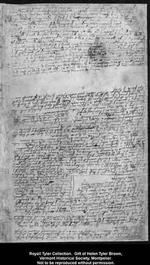
[Page 28, upside down] [ON A PETITION FROM BRAINTREE TROOPS ENLISTED FOR THE EXPEDITION AGAINST CANADA, DECEMBER 1758 - JANUARY 1759.]
The general Court agreed to raise 7000 men, to cooperate with his Majesties Forces, for the Reduction of Canada. Agreed, consented by a Vote an Order not by a Law an Act. They make Acts to raise money and clothe the soldiers when raised. But the K [King], in the british Constitution, and of Consequence the Governor in ours, has the sole Direction of Peace and War.Inlisting men, sending them out, proclaiming War, negociating Peace, concluding Peace, are all with the sovereign's Power. But the Parliament must raise supplies.
The Court direct and impower the Treasurer to borrow 28,000, and they enact that the said 28,000 when [whensoever] borrowed, shall be issued by the Governor, with Advice of Council, for the levying and cloathing the said 7000 men, pursuant to the Order of this Court, and for no other use. -- By Order of Court, and with Advice of Councill.
Cur [i.e. Court?] will grant these Petitions, that People may be encouraged to list next Spring, even after the time limited for Inlistments, when the officers are impowered to impress, and not to be so obstinate as some were last Spring. Some refused to the last to inlist, and were dragged into the Service at last. If Money was issued by the Governor to the Officers of this Company or Regiment, to be given as a Bounty to these men, who inlisted after the 2d of May as well as to those before, and the Officers have [defrauded?] them of it, should not this Petition [represent?] the fraud and pray an Order on the officers to make Satisfaction? -- Is the Governor, or Coll. Lincoln or Coll. Quincy or Captain Bracket to blame in this Affair. If there was an Order of the Generall Court that such as should inlist after the 2d of May should have the Bounty, as well as those who inlisted before, and the Governor [paid?] Money accordingly, one of them is to blame.


































